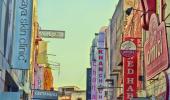'If Khan Market today -- a neon-drenched spectacle of blingy shops and pricey eateries -- is what it is, it's not due to the dramatic shift in political dispensations, but because free-market India is another country,' notes Sunil Sethi.

If certification were needed, I have been part of the 'Khan Market gang' for as long as I can remember.
Never a fully paid-up member because I did not live in the vicinity, but by virtue of kinship and close friendships a longstanding habitue since the 1960s.
Narendra Damodardas Modi's denunciation of the Lutyens elite is another classist label on a par with Rahul Gandhi's insult of 'suit boot ki sarkar'.
BJP General Secretary Ram Madhav, however, elaborates further.
The thundering triumph of the election result, he writes, 'has completed the rejection and decimation... of the 'Khan Market cacophony'... of pseudo-secular/liberal cartels that held a disproportionate sway and stranglehold over the intellectual and policy establishment of the country'.
As definitions go, Mr Madhav's is reductive, superficial and without context.
As a post-Partition refugee market -- family-run shops below, poky flats above -- it was principally the domain of Jan Sanghis, though Congress politicians such as I K Gujral and Jag Pravesh Chandra also had flats there.
Its chief clientele was junior or mid-level bureaucrats who occupied the neighbouring housing estates of Shaan Nagar and Maan Nagar (now Bharti Nagar and Rabindra Nagar, respectively).
My uncle, an Information Service officer, lived in Bharti Nagar for decades.
Downstairs was the patrician H D Shourie, father of Arun Shourie; his daughter Nalini Singh was married from that low-key home.
Many of my school friends, sons of resolutely middle class officials, lived there.
An elderly relative, a formidable Lahore matriarch, let out her two Khan Market shops facing Sujan Singh Park to a sharp-tongued halwai and carried on a noisy running feud over rent.
Over the years, mid-career civil servants en poste in the capital, such as Bhaskar Ghose, Arundhati Ghose, Aftab Seth, Ashok Jaitly and his wife Jaya Jaitley, to name just a few, lived in adjacent sarkari housing.
Nandini Mehta, the journalist and publishing editor, whose father was a high-ranking ex-ICS officer (and therefore occupied bungalows in Lodi Gardens and Lodi Estate), wrote a telling memoir of Khan Market in 2006: 'It's an interesting exercise to try and recall what was NOT available in Khan Market... there were no readymade women's clothes, no bread except sliced white, no sneakers except smelly white or brown canvas keds, no cosmetics except talcum powder, kajal, and what was known as 'vanishing' or 'cold' cream. You couldn't buy a cup of coffee there -- and you never saw a foreigner either (the diplomats shopped in CP).'
When Ms Mehta's brother and she sneakily bought a copy of James Thurber's harmless humour titled Is Sex Necessary? at Bahrisons booksellers, Mr Bahri rang up their mother and said, "I want to warn you, your children are reading very unsuitable books."
Thankfully, Bahrisons still exists and I recall amiably chatting with fellow browsers such as L K Advani and Romila Thapar in later years.
Like any commercial hub, Khan Market never subscribed to political or ideological divisions.
On freezing winter evenings my cousins and I would pool our meagre weekly allowance to splurge on bowls of canned tomato soup and greasy hamburgers in the dingy Alfina restaurant.
It was the only one.
There was one printing shop, The Services Press, one children's clothing store called Chun Mun, and next door, our GP Dr (Miss) Gilani's clinic.
The only posh establishment, among small time shops purveying modest merchandise, was Empire Stores, with provisions that ranged from 'ham to boxes of toilet paper (it came in shiny rectangular sheets) to liquor'.
In the high noon of Indira Gandhi's 'quota raj' of the 1970s, key beneficiaries of grace-and-favour housing near Khan Market were my peers and colleagues in the media.
The list is too long, but to mention some names: Nikhil Chakravartty, Raghu Rai, Amita Malik, H K Dua et al.
At times it seemed that senior members of the news bureaus of the main dailies all lived in subsidised flats.
By the 1990s this form of largesse began to wane; they were turfed out, the vacancies allotted to droves of more officials.
Mr Modi and the ruling political elite's disdain of the media is well-established but to condemn Khan Market-goers as an entrenched herd of 'pseudo-secular/liberal cartels' would necessarily include a swathe of New Delhi's official establishment who are the neighbourhood's main residents.
An IAS officer, member of an informal group of batch mates that regularly met to pick over the election campaign, said the other day: "We're checking out Khan Market's beer bars, one by one."
If Khan Market today -- a neon-drenched spectacle of blingy shops and pricey eateries -- is what it is, it's not due to the dramatic shift in political dispensations, but because free-market India is another country, with its gilt-edged (but guilt-free) high spenders.
Shakespeare is worth recalling: 'The fault, dear Brutus, is not in our stars, But in ourselves, that we are underlings.'
Or as a WhatsApp message offering cheap credit pithily sums up the new age of Narendra Modi: "Ab hum sab chaabidaar hain (We are all key-holders to the kitty).'
Photograph: Kind courtesy Khan Market/Facebook












 © 2025
© 2025